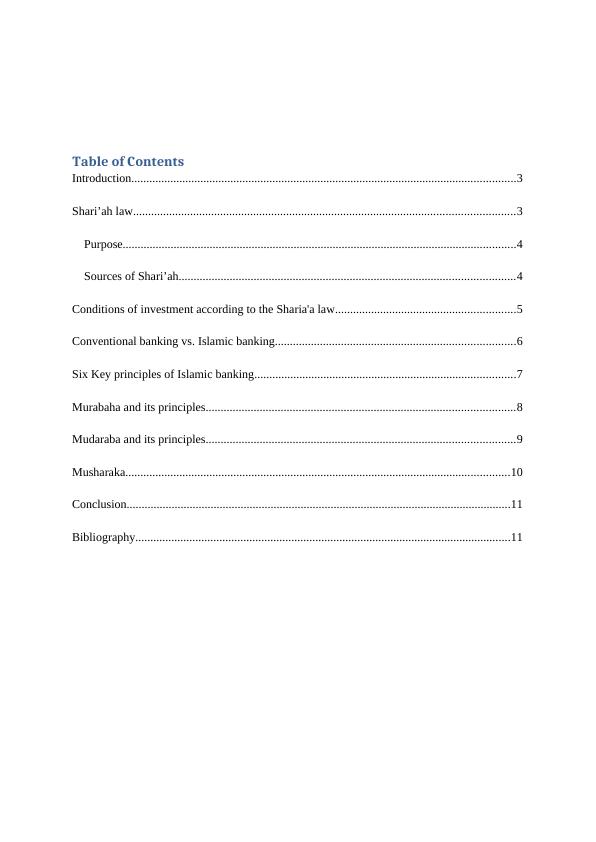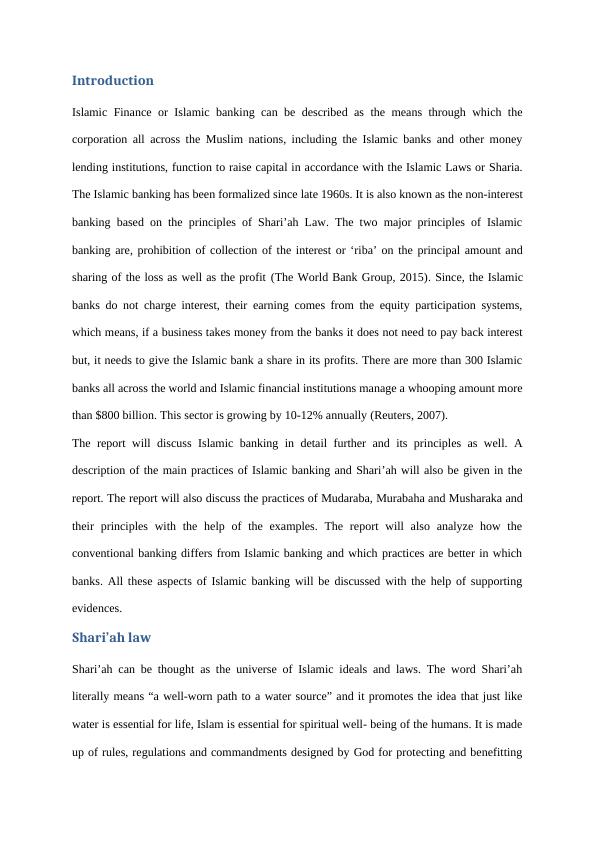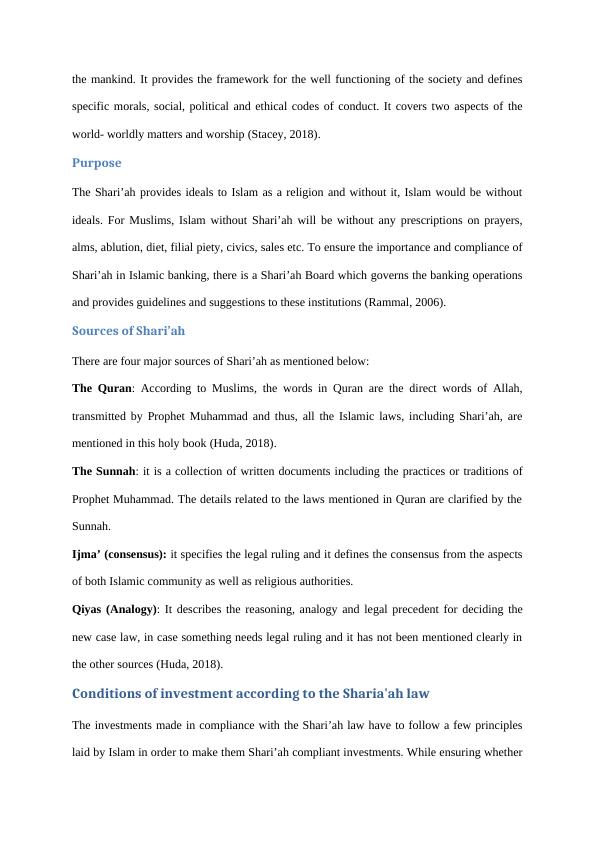Islamic Finance: Principles and Practices
Added on 2023-05-28
12 Pages3411 Words102 Views
Islamic Finance

Table of Contents
Introduction................................................................................................................................3
Shari’ah law...............................................................................................................................3
Purpose...................................................................................................................................4
Sources of Shari’ah................................................................................................................4
Conditions of investment according to the Sharia'a law............................................................5
Conventional banking vs. Islamic banking................................................................................6
Six Key principles of Islamic banking.......................................................................................7
Murabaha and its principles.......................................................................................................8
Mudaraba and its principles.......................................................................................................9
Musharaka................................................................................................................................10
Conclusion................................................................................................................................11
Bibliography.............................................................................................................................11
Introduction................................................................................................................................3
Shari’ah law...............................................................................................................................3
Purpose...................................................................................................................................4
Sources of Shari’ah................................................................................................................4
Conditions of investment according to the Sharia'a law............................................................5
Conventional banking vs. Islamic banking................................................................................6
Six Key principles of Islamic banking.......................................................................................7
Murabaha and its principles.......................................................................................................8
Mudaraba and its principles.......................................................................................................9
Musharaka................................................................................................................................10
Conclusion................................................................................................................................11
Bibliography.............................................................................................................................11

Introduction
Islamic Finance or Islamic banking can be described as the means through which the
corporation all across the Muslim nations, including the Islamic banks and other money
lending institutions, function to raise capital in accordance with the Islamic Laws or Sharia.
The Islamic banking has been formalized since late 1960s. It is also known as the non-interest
banking based on the principles of Shari’ah Law. The two major principles of Islamic
banking are, prohibition of collection of the interest or ‘riba’ on the principal amount and
sharing of the loss as well as the profit (The World Bank Group, 2015). Since, the Islamic
banks do not charge interest, their earning comes from the equity participation systems,
which means, if a business takes money from the banks it does not need to pay back interest
but, it needs to give the Islamic bank a share in its profits. There are more than 300 Islamic
banks all across the world and Islamic financial institutions manage a whooping amount more
than $800 billion. This sector is growing by 10-12% annually (Reuters, 2007).
The report will discuss Islamic banking in detail further and its principles as well. A
description of the main practices of Islamic banking and Shari’ah will also be given in the
report. The report will also discuss the practices of Mudaraba, Murabaha and Musharaka and
their principles with the help of the examples. The report will also analyze how the
conventional banking differs from Islamic banking and which practices are better in which
banks. All these aspects of Islamic banking will be discussed with the help of supporting
evidences.
Shari’ah law
Shari’ah can be thought as the universe of Islamic ideals and laws. The word Shari’ah
literally means “a well-worn path to a water source” and it promotes the idea that just like
water is essential for life, Islam is essential for spiritual well- being of the humans. It is made
up of rules, regulations and commandments designed by God for protecting and benefitting
Islamic Finance or Islamic banking can be described as the means through which the
corporation all across the Muslim nations, including the Islamic banks and other money
lending institutions, function to raise capital in accordance with the Islamic Laws or Sharia.
The Islamic banking has been formalized since late 1960s. It is also known as the non-interest
banking based on the principles of Shari’ah Law. The two major principles of Islamic
banking are, prohibition of collection of the interest or ‘riba’ on the principal amount and
sharing of the loss as well as the profit (The World Bank Group, 2015). Since, the Islamic
banks do not charge interest, their earning comes from the equity participation systems,
which means, if a business takes money from the banks it does not need to pay back interest
but, it needs to give the Islamic bank a share in its profits. There are more than 300 Islamic
banks all across the world and Islamic financial institutions manage a whooping amount more
than $800 billion. This sector is growing by 10-12% annually (Reuters, 2007).
The report will discuss Islamic banking in detail further and its principles as well. A
description of the main practices of Islamic banking and Shari’ah will also be given in the
report. The report will also discuss the practices of Mudaraba, Murabaha and Musharaka and
their principles with the help of the examples. The report will also analyze how the
conventional banking differs from Islamic banking and which practices are better in which
banks. All these aspects of Islamic banking will be discussed with the help of supporting
evidences.
Shari’ah law
Shari’ah can be thought as the universe of Islamic ideals and laws. The word Shari’ah
literally means “a well-worn path to a water source” and it promotes the idea that just like
water is essential for life, Islam is essential for spiritual well- being of the humans. It is made
up of rules, regulations and commandments designed by God for protecting and benefitting

the mankind. It provides the framework for the well functioning of the society and defines
specific morals, social, political and ethical codes of conduct. It covers two aspects of the
world- worldly matters and worship (Stacey, 2018).
Purpose
The Shari’ah provides ideals to Islam as a religion and without it, Islam would be without
ideals. For Muslims, Islam without Shari’ah will be without any prescriptions on prayers,
alms, ablution, diet, filial piety, civics, sales etc. To ensure the importance and compliance of
Shari’ah in Islamic banking, there is a Shari’ah Board which governs the banking operations
and provides guidelines and suggestions to these institutions (Rammal, 2006).
Sources of Shari’ah
There are four major sources of Shari’ah as mentioned below:
The Quran: According to Muslims, the words in Quran are the direct words of Allah,
transmitted by Prophet Muhammad and thus, all the Islamic laws, including Shari’ah, are
mentioned in this holy book (Huda, 2018).
The Sunnah: it is a collection of written documents including the practices or traditions of
Prophet Muhammad. The details related to the laws mentioned in Quran are clarified by the
Sunnah.
Ijma’ (consensus): it specifies the legal ruling and it defines the consensus from the aspects
of both Islamic community as well as religious authorities.
Qiyas (Analogy): It describes the reasoning, analogy and legal precedent for deciding the
new case law, in case something needs legal ruling and it has not been mentioned clearly in
the other sources (Huda, 2018).
Conditions of investment according to the Sharia'ah law
The investments made in compliance with the Shari’ah law have to follow a few principles
laid by Islam in order to make them Shari’ah compliant investments. While ensuring whether
specific morals, social, political and ethical codes of conduct. It covers two aspects of the
world- worldly matters and worship (Stacey, 2018).
Purpose
The Shari’ah provides ideals to Islam as a religion and without it, Islam would be without
ideals. For Muslims, Islam without Shari’ah will be without any prescriptions on prayers,
alms, ablution, diet, filial piety, civics, sales etc. To ensure the importance and compliance of
Shari’ah in Islamic banking, there is a Shari’ah Board which governs the banking operations
and provides guidelines and suggestions to these institutions (Rammal, 2006).
Sources of Shari’ah
There are four major sources of Shari’ah as mentioned below:
The Quran: According to Muslims, the words in Quran are the direct words of Allah,
transmitted by Prophet Muhammad and thus, all the Islamic laws, including Shari’ah, are
mentioned in this holy book (Huda, 2018).
The Sunnah: it is a collection of written documents including the practices or traditions of
Prophet Muhammad. The details related to the laws mentioned in Quran are clarified by the
Sunnah.
Ijma’ (consensus): it specifies the legal ruling and it defines the consensus from the aspects
of both Islamic community as well as religious authorities.
Qiyas (Analogy): It describes the reasoning, analogy and legal precedent for deciding the
new case law, in case something needs legal ruling and it has not been mentioned clearly in
the other sources (Huda, 2018).
Conditions of investment according to the Sharia'ah law
The investments made in compliance with the Shari’ah law have to follow a few principles
laid by Islam in order to make them Shari’ah compliant investments. While ensuring whether

End of preview
Want to access all the pages? Upload your documents or become a member.
Related Documents
Analysis of Islamic Finance and its Impact on Financial Statementslg...
|17
|1293
|1
Introduction to Islamic Banking: A Comparative Study of Dubai Islamic Bank and United Arab Banklg...
|11
|2758
|396
Islamic Banking in theory and practicelg...
|17
|4078
|79
How Islamic Banks are Spared from Financial Crisis of 2008lg...
|30
|9603
|461
Performance Management System Alizz Islamic Banklg...
|13
|4110
|398
Introduction to Islamic Banking & Finance and Rationale of Prohibition of Riba in Islamlg...
|21
|7545
|495
